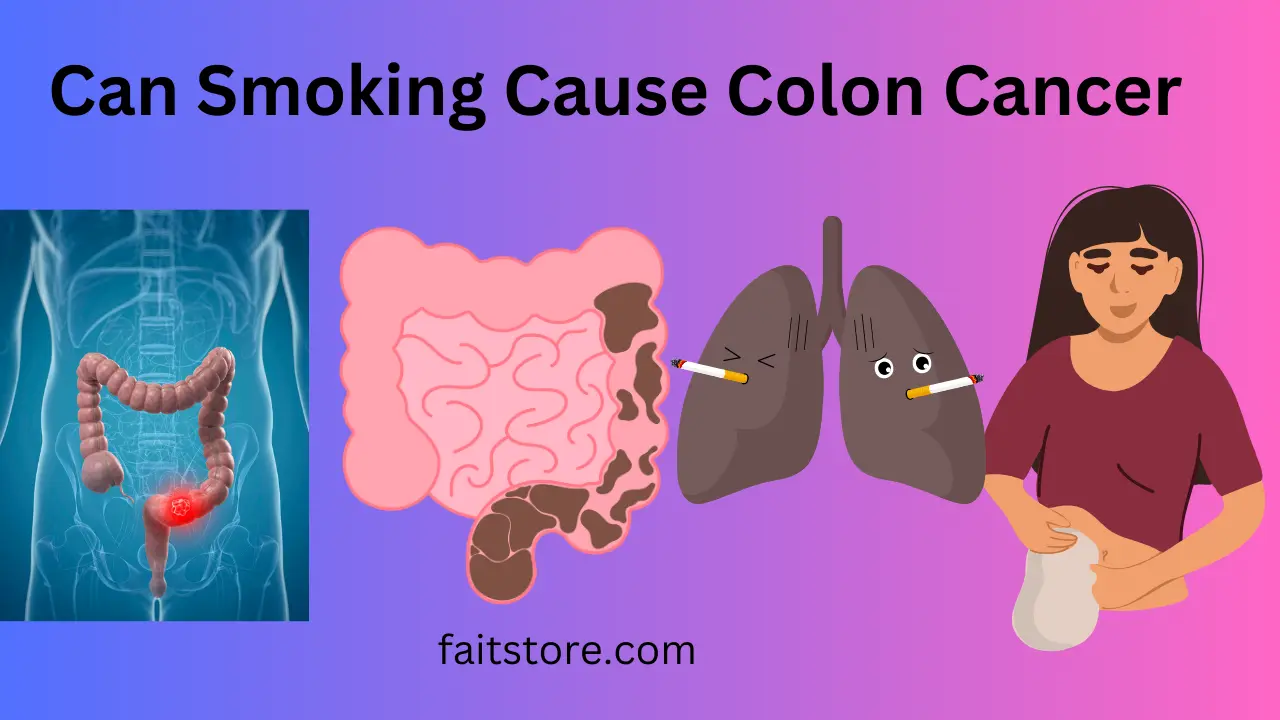
can smoking cause colon cancer
Smoking is a dangerous habit strongly associated with various health conditions, including lung cancer, heart disease, and respiratory problems. However, can smoking cause colon cancer? This article will delve into the relationship between smoking and colon cancer, examining the potential risks and exploring the scientific evidence. Whether you’re a smoker or concerned about the health implications of smoking, understanding the connection between smoking and colon cancer is essential for making informed decisions about your well-being.can smoking cause colon cancer
What is Colon Cancer?
Colon cancer, also known as colorectal cancer, is a type of cancer that develops in the colon or rectum. The colon is a part of the digestive system that helps absorb water and nutrients from our food, while the rectum is the lower part of the colon that connects to the anus.
Colon cancer typically begins as small, noncancerous growths called polyps on the inner lining of the colon or rectum. Over time, some of these polyps may become cancerous and develop into tumors. If left untreated, colon cancer can spread to other body parts, such as the lymph nodes or liver.can smoking cause colon cancer
The exact cause of colon cancer is not known, but certain factors can increase the risk of developing this disease. These include a family history of colon cancer, age (most cases occur in people over 50), a history of inflammatory bowel disease, a diet high in processed foods and low in fiber, a sedentary lifestyle, obesity, smoking, and heavy alcohol consumption.
Symptoms of colon cancer can vary depending on the stage of the disease. In the early stages, there may be no noticeable symptoms. However, as cancer progresses, common symptoms can include changes in bowel habits (such as diarrhea or constipation), blood in the stool, abdominal pain or cramps, unexplained weight loss, fatigue, and a feeling of incomplete bowel movements.
Screening for colon cancer is crucial for early detection and better treatment outcomes. Common screening methods include colonoscopy, where a doctor examines the colon and rectum using a long, flexible tube with a camera, and stool tests to check for the presence of blood or abnormal cells.
Treatment options for colon cancer depend on the stage and extent of the disease. They may include surgery to remove the tumor, chemotherapy, radiation therapy, targeted therapy, and immunotherapy. The prognosis and survival rate for colon cancer varies based on various factors, including the stage at diagnosis and individual characteristics.can smoking cause colon cancer
Early detection and regular screening are key to preventing or catching colon cancer at an early and treatable stage. Maintaining a healthy lifestyle, such as eating a balanced diet, engaging in regular physical activity, avoiding smoking and excessive alcohol consumption, can also help reduce the risk of developing colon cancer.

Smoking and Colon Cancer
A recognized link exists between smoking and an increased risk of colon cancer. Numerous studies have provided evidence that cigarette smoking can contribute to the development and progression of this type of cancer.
The harmful chemicals present in tobacco smoke can enter the bloodstream and affect various organs and tissues throughout the body, including the colon. These chemicals can cause genetic mutations and damage to the DNA, leading to the uncontrolled growth of cells and the formation of cancerous tumors.
Several research studies have consistently shown that smokers are at a higher risk of developing colon cancer compared to non-smokers. The risk appears to be dose-dependent, meaning that the more cigarettes a person smokes and the longer they have smoked, the higher their risk becomes. Secondhand smoke exposure has also been associated with an increased risk of colon cancer, although the risk is generally lower than active smoking.
Furthermore, smoking has been linked to more advanced stages of colon cancer at the time of diagnosis and an increased risk of recurrence and mortality. Smokers with colon cancer may also experience poorer treatment outcomes and a higher likelihood of complications compared to non-smokers.
It is worth noting that the link between smoking and colon cancer is complex and can be influenced by other factors such as diet, lifestyle, and genetic predisposition. However, quitting smoking can significantly reduce the risk of developing colon cancer and improve overall health.can smoking cause colon cancer
If you are a smoker, it is highly advisable to quit smoking to lower your risk of colon cancer and other tobacco-related diseases. Various resources are available to help individuals quit smoking, including counseling, support groups, nicotine replacement therapies, and medications. Consulting with healthcare professionals can provide personalized guidance and support in leaving.
Smoking increases the risk of developing colon cancer, poorer treatment outcomes, and higher mortality rates. Quitting smoking is essential to reducing the risk of colon cancer and improving overall health.
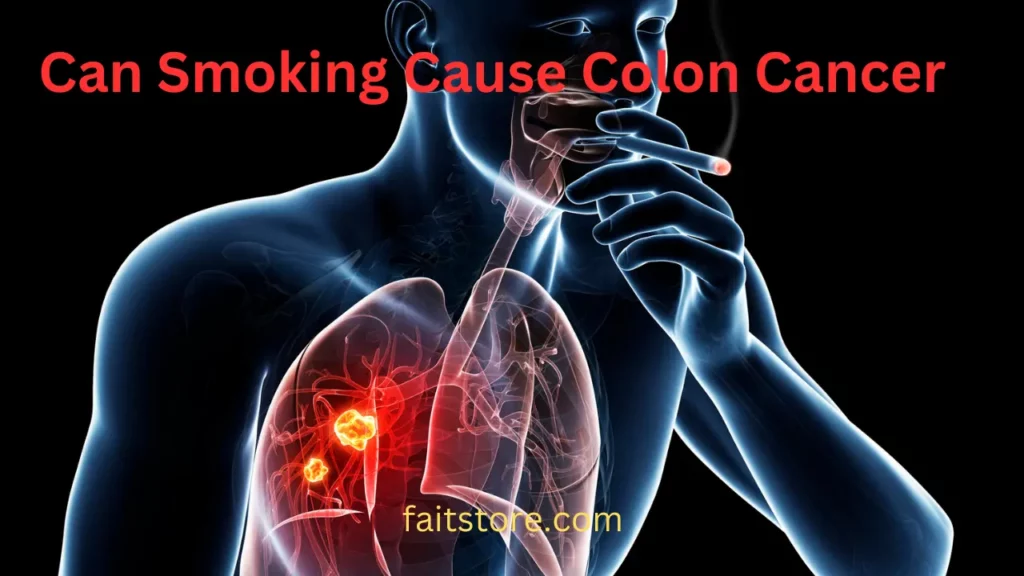
Research Studies and Findings
Numerous research studies have investigated the link between smoking and colon cancer. Here are some notable findings:
- A study published in the Journal of the National Cancer Institute analyzed data from over 185,000 participants and found that smokers had a significantly higher risk of developing colon cancer than non-smokers. The risk increased with the number of cigarettes smoked per day and the duration of smoking.
- A meta-analysis of 106 studies published in the Annals of Oncology concluded that smoking was associated with a 27% increased risk of colon cancer. The analysis also showed that the risk remained elevated even after adjusting for other factors such as alcohol consumption and body mass index (BMI).
- Another large-scale study, published in the Journal of the American Medical Association, followed over 186,000 participants for an extended period and found that current smokers had a 19% higher risk of developing colon cancer than individuals who had never smoked. The study also indicated that the risk decreased over time after quitting smoking.
- A research study published in the British Medical Journal investigated the impact of smoking cessation on the risk of colon cancer. The study followed over 200,000 individuals for several years and found that those who quit smoking had a reduced risk of colon cancer compared to current smokers. The risk continued to decrease the longer a person abstained from smoking.can smoking cause colon cancer
- A study published in the Cancer Epidemiology, Biomarkers & Prevention journal examined the relationship between secondhand smoke exposure and colon cancer risk. The findings suggested that exposure to secondhand smoke was associated with a modestly increased risk of developing colon cancer, particularly among non-smoking women.
These research studies, among others, consistently demonstrate a significant association between smoking and an increased risk of colon cancer. The findings highlight the importance of quitting smoking to reduce the risk of developing this type of cancer. It is essential to note that research in this field is ongoing, and further studies may provide additional insights into the link between smoking and colon cancer.
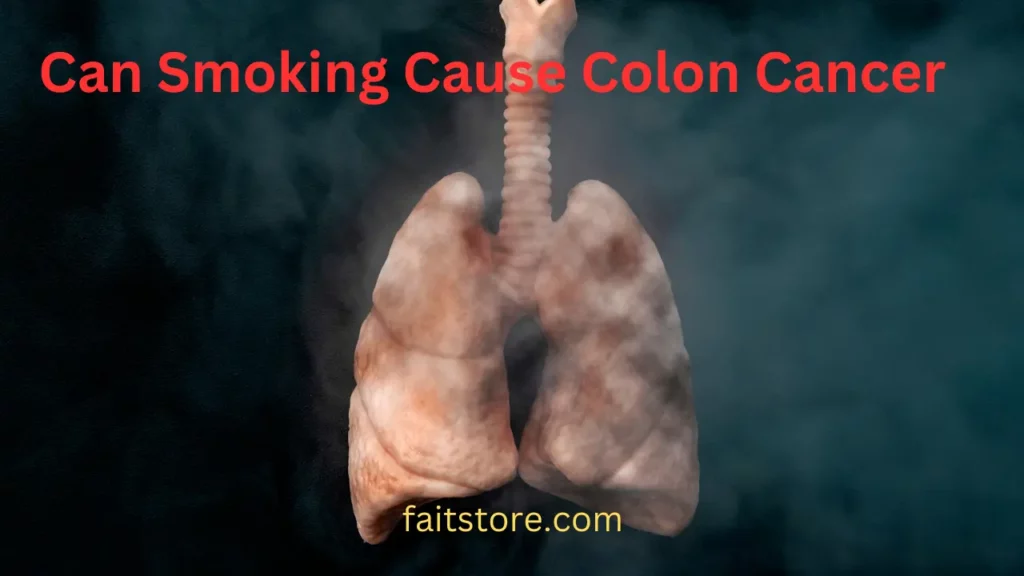
Mechanisms of Smoking and Colon Cancer
The exact mechanism by which smoking increases the risk of colon cancer is not fully understood. However, several potential mechanisms have been proposed based on research studies. Here are some possible ways in which smoking may contribute to the development of colon cancer:
- DNA damage: Cigarette smoke contains numerous harmful chemicals, including carcinogens. These chemicals can enter the bloodstream and reach the colon, where they can cause DNA damage and mutations in the cells lining the colon. DNA damage disrupts the normal functioning of cells and can lead to uncontrolled cell growth, a hallmark of cancer development.
- Inflammation: Smoking is known to induce chronic inflammation in various tissues, including the colon. Prolonged inflammation can promote the growth of abnormal cells and contribute to the progression of cancer. Inflammatory processes triggered by smoking can also compromise the immune system’s ability to detect and eliminate cancer cells.
- Oxidative stress: Smoking increases the production of reactive oxygen species (ROS) in the body. ROS are highly reactive molecules that can cause damage to cells, including those in the colon. Over time, persistent oxidative stress can lead to cellular dysfunction and promote cancer development.can smoking cause colon cancer
- Altered gene expression: Smoking can affect the expression of certain genes involved in cell growth regulation and DNA repair mechanisms. Studies have shown that smoking-related changes in gene expression patterns can contribute to the initiation and progression of colon cancer.
- Effects on gut microbiota: Emerging research suggests that smoking can alter the composition and diversity of the gut microbiota, the collection of microorganisms residing in the intestinal tract. Disruptions in the gut microbiota have been associated with an increased risk of colon cancer, and smoking may potentially influence this risk through its effects on the microbial ecosystem.
The mechanisms described above are not mutually exclusive, and multiple factors are likely at play in the relationship between smoking and colon cancer. Additionally, the specific biological mechanisms may vary among individuals.
Further research must fully elucidate the complex interplay between smoking and colon cancer development. However, the evidence supports the conclusion that smoking contributes to an increased risk of colon cancer through various biological pathways. Quitting smoking is crucial in reducing this risk and improving overall health.
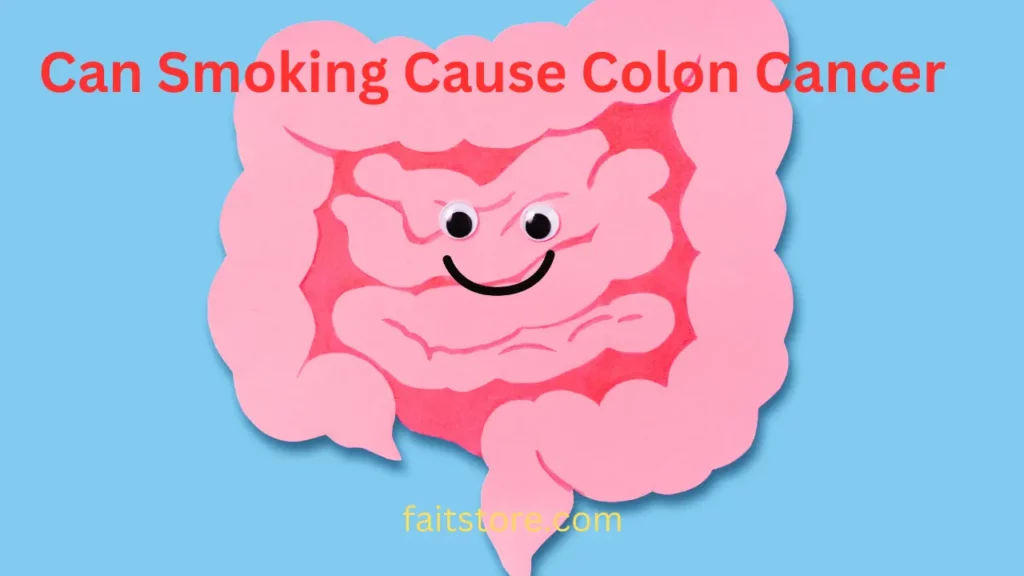
Risk Factors for Colon Cancer
In addition to smoking, several other risk factors have been identified for colon cancer. Understanding these risk factors can help individuals assess their personal risk and take appropriate measures for prevention. Here are some notable risk factors:
- Age: The risk of colon cancer increases with age, and most cases are diagnosed in individuals over the age of 50. Regular screenings for colon cancer are recommended, particularly for those in this age group.
- Family history and inherited genetic conditions: A family history of colon cancer or certain inherited genetic disorders, such as Lynch syndrome or familial adenomatous polyposis (FAP), increases the risk of developing the disease. Your risk is higher if you have a close relative (parent, sibling, or child) with colon cancer.
- Personal history of colon polyps or inflammatory bowel disease (IBD): Individuals who have previously had colon polyps, especially large or multiple adenomatous polyps, are at an increased risk of developing colon cancer. Moreover, people with chronic inflammatory bowel diseases, such as ulcerative colitis or Crohn’s disease, have a higher risk of colon cancer.can smoking cause colon cancer
- Unhealthy diet: A diet high in processed foods, red and processed meats, and low in fiber has been linked to an increased risk of colon cancer. Consuming a diet rich in fruits, vegetables, whole grains, and lean proteins can help lower the risk.
- Sedentary lifestyle: Lack of regular physical activity and leading a sedentary lifestyle are associated with an increased risk of colon cancer. Regular physical activity and maintaining a healthy weight can help reduce the risk.
- Obesity: Being overweight or obese is a risk factor for various types of cancers, including colon cancer. Maintaining a healthy weight through a balanced diet and regular exercise is important for reducing the risk.
- Diabetes: Individuals with type 2 diabetes have a higher risk of developing colon cancer. Managing diabetes through lifestyle modifications and medication, if necessary, can help reduce the risk.
- Alcohol consumption: Heavy and regular alcohol consumption has been associated with an increased risk of colon cancer. Limiting alcohol intake to moderate levels (up to one drink per day for women and up to two drinks per day for men) is recommended.
- Racial and ethnic background: Some racial and ethnic groups, such as African Americans and Ashkenazi Jews, have a higher incidence of colon cancer than other populations.
- Radiation therapy: Previous radiation therapy for other cancers, especially in the abdominal or pelvic area, can increase the risk of developing colon cancer later in life.
having one or more risk factors does not necessarily mean an individual will develop colon cancer. Conversely, some individuals without any apparent risk factors can still develop the disease. Regular screenings and adopting a healthy lifestyle can help reduce the risk of colon cancer regardless of individual risk factors.
Effects of Smoking on Colon Health
Smoking has detrimental effects on colon health. Here are some of the ways smoking can impact the colon:
- Increased risk of colon cancer: Smoking is a significant risk factor for developing colon cancer. As mentioned earlier, the chemicals present in tobacco smoke can cause DNA damage and mutations in the cells lining the colon. These genetic changes can lead to the development of cancerous tumors. Smokers are more likely to develop colon cancer than non-smokers, and the risk increases with the duration and intensity of smoking.
- Colon polyps: Smoking has been associated with an increased risk of developing colon polyps. Polyps are abnormal growths on the colon’s inner lining, and some polyps can progress to colon cancer over time. Smokers tend to have a higher prevalence of certain polyp types, such as adenomatous polyps, which are considered precursors to colon cancer.can smoking cause colon cancer
- Impaired healing and recovery: Smoking can impair the healing process and recovery after surgical procedures in the colon. Individuals who smoke may experience delayed wound healing, increased risk of postoperative complications, and longer hospital stays following colon surgery.
- Inflammatory bowel disease (IBD) complications: Smoking can exacerbate the symptoms and increase the severity of inflammatory bowel diseases such as ulcerative colitis and Crohn’s disease. Smoking has been associated with an increased risk of flare-ups and complications in individuals with IBD, including a higher likelihood of requiring surgery or experiencing disease progression.
- Impaired response to treatment: Smoking can negatively impact the reaction to colon cancer treatment. Studies have shown that smokers with colon cancer may have poorer treatment outcomes compared to non-smokers. They may be at a higher risk of disease recurrence, reduced survival rates, and increased treatment-related complications.
- Increased risk of diverticular disease: Diverticular disease involves the formation of small pouches (diverticula) in the colon wall. Smoking has been associated with an increased risk of developing diverticular disease, particularly in younger individuals. Diverticular disease can lead to complications such as diverticulitis (inflammation or infection of the pouches) or diverticular bleeding.can smoking cause colon cancer
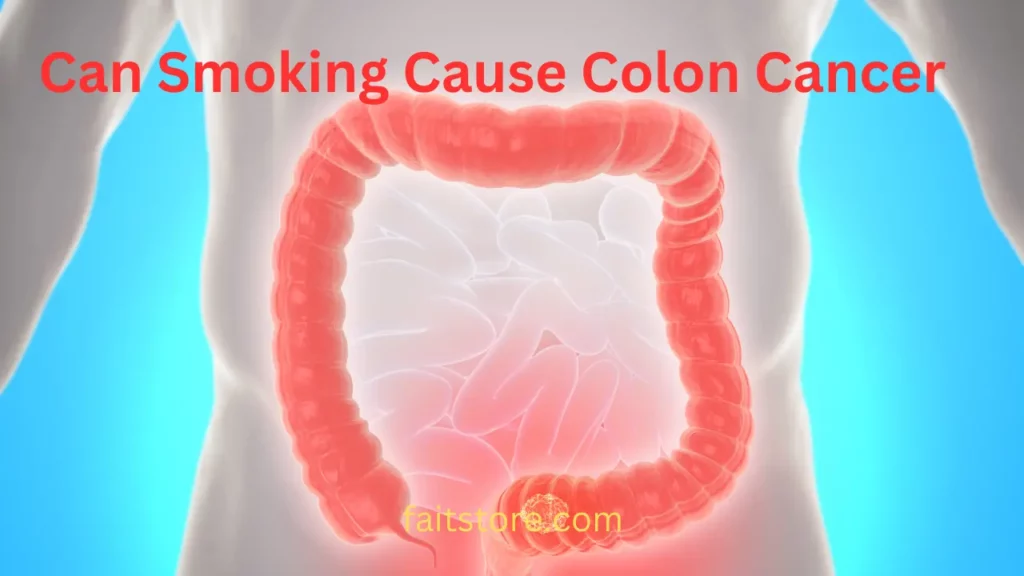
Given these detrimental effects on colon health, quitting smoking is crucial for improving colon health and reducing the associated risks. Quitting smoking can significantly lower the risk of developing colon cancer, improve surgical outcomes, lessen complications of inflammatory bowel disease, and contribute to better colon health. It is never too late to quit smoking, and healthcare professionals can guide and support individuals looking to retire.
Early Detection and Prevention of Colon Cancer
Early detection and prevention play crucial roles in reducing the burden of colon cancer. Here are some key strategies for early detection and prevention:
Screening: Regular screening for colon cancer is essential, especially for individuals 50 and older. Screening tests can detect precancerous polyps or early-stage cancer when treatment is most effective. The most common screening method is a colonoscopy, which involves visually examining the colon and rectum using a flexible tube with a camera. Other screening options include stool-based tests, such as the fecal occult blood test (FOBT) or fecal immunochemical test (FIT), which detect blood or abnormal DNA in the stool. The choice of screening method depends on individual preferences and risk factors, and it is best to discuss with a healthcare provider to determine the most suitable approach.
Healthy lifestyle: Adopting a healthy lifestyle can help reduce the risk of colon cancer. This includes:
- Balanced diet: Consume a diet rich in fruits, vegetables, whole grains, and lean proteins. Limit the consumption of red and processed meats, and minimize the intake of sugary drinks and processed foods.
- Regular exercise: Daily physical activity, such as brisk walking, jogging, or cycling, for at least 150 minutes per week. Regular exercise helps maintain a healthy weight and promotes overall well-being.
- Avoid smoking: Quit smoking or avoid tobacco use altogether. Smoking is a significant risk factor for colon cancer, and quitting can have immediate and long-term health benefits.
- Limit alcohol consumption: If you choose to drink alcohol, do so in moderation. Limit intake to up to one drink per day for women and up to two drinks per day for men.
- Maintain a healthy weight: Aim for a healthy body weight by balancing calorie intake with physical activity. Obesity is associated with an increased risk of colon cancer, so maintaining a healthy weight is important.
Know your family history:Understanding your history of colon cancer or related conditions can help assess your risk. If you have a close relative who has had colon cancer, starting screening earlier or having more frequent screenings may be recommended. Discuss your family history with a healthcare provider to determine the appropriate screening approach.
Recognize and act on symptoms: Be aware of potential signs and symptoms of colon cancer, such as changes in bowel habits, blood in the stool, abdominal pain or cramps, unexplained weight loss, and fatigue. If you experience persistent or concerning symptoms, seeking medical attention promptly for further evaluation is important.can smoking cause colon cancer
Follow healthcare provider recommendations: Regularly visit your healthcare provider and follow their advice regarding screening, preventive measures, and overall colon health. They can provide personalized guidance based on your risk factors and medical history.
By emphasizing early detection through screening and adopting a healthy lifestyle, the risk of colon cancer can be significantly reduced. It is important to raise awareness about the importance of colon cancer prevention and encourage individuals to take proactive steps for their colon health.
Tips for Quitting Smoking
Quitting smoking is a challenging but worthwhile endeavor that can greatly improve your health. Here are some tips to help you quit smoking:
- Set a quit date: Choose a specific date to stop smoking. Having a target date helps you mentally prepare and commit to quitting.
- Seek support: Inform your friends, family, and coworkers about your decision to quit smoking. Their support, encouragement, and understanding can be invaluable. Consider joining a support group or seeking counseling services to enhance your success chances.
- Nicotine replacement therapy (NRT): Nicotine replacement products, such as nicotine patches, gum, lozenges, inhalers, or nasal sprays, can help reduce withdrawal symptoms and cravings. Consult a healthcare professional to determine which NRT method is most suitable for you.
- Prescription medications: There are prescription medications available that can aid in smoking cessation. Medications like bupropion or varenicline can help reduce cravings and withdrawal symptoms. Consult with a healthcare provider to discuss whether these medications suit you and obtain a prescription if needed.
- Identify triggers and make a plan: Identify situations, activities, or emotions that trigger your urge to smoke. Develop strategies to cope with these triggers. For example, if you tend to smoke after meals, consider taking a short walk or engaging in a different activity to distract yourself.
- Modify your routines: Make changes to your daily routines to break the association between certain activities and smoking. For instance, if you used to smoke while drinking coffee, switch to tea or try drinking in a different location.
- Practice stress management techniques: Smoking is often used as a coping mechanism for stress. Explore alternative stress management techniques such as deep breathing exercises, meditation, yoga, or engaging in hobbies and activities that you enjoy.
- Stay active: Regular physical activity can help reduce cravings and manage withdrawal symptoms. Engage in activities that you find enjoyable and incorporate them into your daily routine.
- Remove smoking triggers: Get rid of cigarettes, lighters, and ashtrays from your home, car, and workplace. Clean your surroundings to eliminate the smell of smoke.
- Stay positive and persistent: Quitting smoking can be challenging, and setbacks are normal. Don’t be discouraged by relapses. Learn from them and use them as motivation to keep trying. Remind yourself why you want to quit and focus on the health benefits and improvements in your quality of life.can smoking cause colon cancer
quitting smoking is a process, and everyone’s journey is unique. Celebrate your milestones and small victories along the way. Don’t hesitate to reach out for professional help if needed. With determination, support, and the right strategies, you can successfully quit smoking and enjoy a healthier, smoke-free life.
Support and Resources
Numerous support and resources are available to assist you in your journey to quit smoking. Here are some options to consider:
- National Quitline or Helpline: Many countries have dedicated quitlines or helplines that provide free, confidential support and guidance to individuals looking to quit smoking. Trained counselors can offer personalized advice, coping strategies, and information about available resources. These helplines may also provide assistance in developing a quit plan tailored to your specific needs.
- Online Quit Programs: Various websites and online platforms offer comprehensive quit programs and resources. These platforms often include tools such as quit trackers, personalized quit plans, and interactive support communities. They may also provide educational materials, tips for managing cravings, and strategies for staying motivated.
- Mobile Apps: Several smartphone apps are designed to help individuals quit smoking. These apps can provide daily motivation, track your progress, offer coping strategies, and send reminders to help you stay on track. Some popular quit-smoking apps include “Smoke-Free,” “QuitNow!,” and “MyQuit Coach.”
- Support Groups: Joining a support group can provide a sense of community and shared experiences. Local community centers, hospitals, or organizations often host quit-smoking support groups. These groups offer a supportive environment to connect with others going through similar challenges and share strategies, encouragement, and success stories.can smoking cause colon cancer
- Counseling Services: Individual counseling or therapy can be beneficial for those who require additional support or have complex smoking cessation needs. Counselors or therapists specializing in addiction or smoking cessation can provide personalized guidance, behavior modification strategies, and coping mechanisms to help you overcome challenges and maintain motivation.
- Healthcare Professionals: Your healthcare provider can offer valuable guidance and support throughout your quitting journey. They can provide personalized advice, discuss available medications or nicotine replacement therapies, and monitor your progress. Consult your healthcare professional to create a tailored quit plan and address concerns or questions.
- Educational Resources: Educating yourself about the risks of smoking, the benefits of quitting, and the strategies for stopping can be empowering. Numerous books, websites, brochures, and educational materials provide valuable information on smoking cessation. Organizations like the American Cancer Society, Centers for Disease Control and Prevention (CDC), and World Health Organization (WHO) offer comprehensive resources on quitting smoking.
different strategies work for different individuals, so it may take some experimentation to find what works best for you. Combining multiple support options can also increase your chances of success. Don’t hesitate to reach out and utilize your support and resources. Quitting smoking is a journey, and with the right support, you can achieve your goal of a smoke-free life.
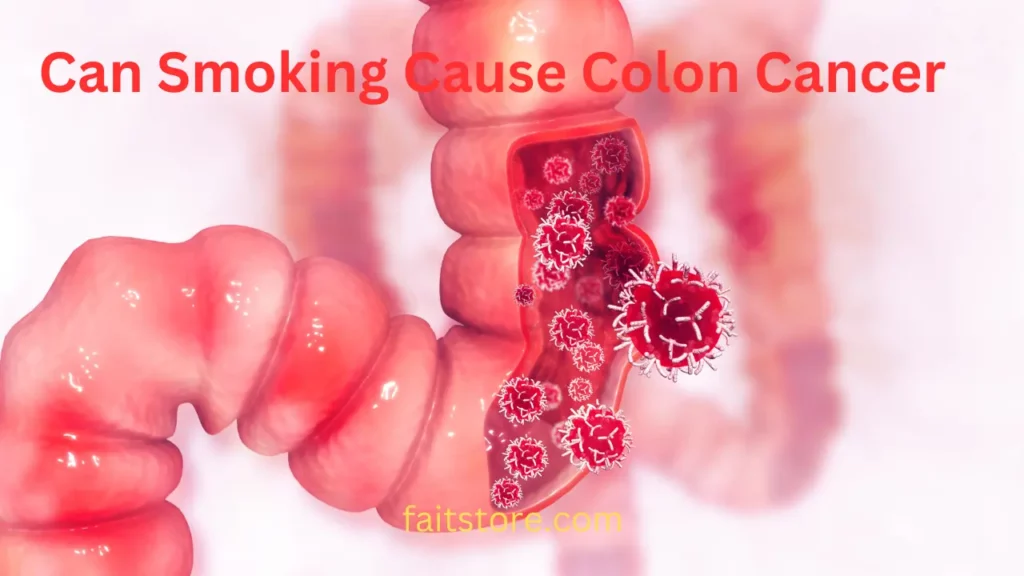
Which organ cancer can be caused by smoking?
Smoking is known to increase the risk of developing various types of cancer. Here are some of the organs that can be affected by smoking-related cancers:
- Lungs: Smoking is the leading cause of lung cancer. The harmful chemicals in tobacco smoke, such as carcinogens, can damage the cells in the lungs and lead to the development of cancerous tumors.
- Mouth and throat: Smoking can cause cancers of the mouth, tongue, throat, and larynx (voice box). The chemicals in tobacco smoke can irritate and damage the cells lining these areas, increasing the risk of cancer.
- Esophagus: Smoking is a significant risk factor for esophageal cancer. The chemicals in tobacco smoke can cause irritation and inflammation in the lining of the esophagus, potentially leading to the development of cancer.
- Bladder: Smoking has been linked to an increased risk of bladder cancer. The harmful substances in tobacco smoke are filtered out by the kidneys and concentrated in the urine, damaging the cells lining the bladder and increasing the risk of cancer.
- Kidneys: Smoking has been associated with an increased risk of kidney cancer. The chemicals in tobacco smoke can affect the blood vessels and tissues of the kidneys, potentially leading to cancerous tumors.can smoking cause colon cancer
- Pancreas: Smoking is a well-established risk factor for pancreatic cancer. The chemicals in tobacco smoke can damage the cells of the pancreas, increasing the likelihood of cancer development.
- Stomach: Smoking has been linked to an increased risk of stomach (gastric) cancer. The chemicals in tobacco smoke can irritate and damage the stomach lining, potentially leading to cancer.
- Liver: Smoking has been associated with an increased risk of liver cancer. Although the exact mechanisms are not fully understood, smoking may contribute to liver cancer development by associating with other risk factors such as hepatitis B or C infection and excessive alcohol consumption.can smoking cause colon cancer
Smoking can also increase the risk of other types of cancers, such as cervical, colorectal, and breast cancer, although the associations may be less strong compared to the aforementioned organs. Quitting smoking is the best way to reduce the risk of developing smoking-related cancers and to improve overall health.
How many cigarettes a day is safe?
There is no safe level of cigarette smoking. The best option for your health is to quit smoking completely.
Cigarette smoking is a major risk factor for numerous health conditions, including cancer, heart disease, respiratory diseases, and stroke. Even smoking a few cigarettes daily can increase your risk of developing these serious health problems.
Numerous scientific studies and health organizations have consistently highlighted the dangers of smoking and the absence of a safe threshold. The Centers for Disease Control and Prevention (CDC), the World Health Organization (WHO), and other reputable health organizations all strongly advise against smoking and emphasize the importance of quitting.
It’s important to note that while quitting smoking is challenging, the benefits are significant and immediate. Within hours of quitting, your body starts to experience positive changes; over time, your risk of developing smoking-related diseases decreases.
If you need support and guidance in quitting smoking, consider contacting healthcare professionals, helplines, or support groups or utilizing the available resources to assist individuals in their quit-smoking journey. Remember, it is never too late to quit, and the sooner you stop smoking, the better it is for your health.can smoking cause colon cancer
Does cigarette affect sperm?
Cigarette smoking can harm male fertility and sperm quality. The chemicals in tobacco smoke can harm the reproductive system and affect the production and function of sperm. Here are some ways in which cigarette smoking can affect sperm:
- Reduced sperm count: Smoking has been associated with a decrease in sperm count, which refers to the number of sperm in a semen sample. A lower sperm count can reduce the chances of fertilization and conception.
- Decreased sperm motility: Smoking can impair the movement or motility of sperm. Sperm need to swim effectively to reach and fertilize an egg. Reduced motility can hinder the ability of sperm to get the egg, thereby reducing fertility.
- Altered sperm morphology: Smoking can cause abnormalities in sperm shape and structure, known as sperm morphology. Abnormal sperm morphology can affect fertility by reducing the chances of successful fertilization.
- DNA damage: The chemicals in cigarette smoke, such as free radicals and toxic compounds, can cause DNA damage in sperm. DNA damage can lead to genetic abnormalities in offspring or increase the risk of infertility.
- Hormonal changes: Smoking can disrupt hormonal balance in the body, including the hormones involved in sperm production. These hormonal changes can negatively impact sperm production and function.
Quitting smoking can help improve sperm quality and fertility. Research suggests that quitting smoking can improve sperm count, motility, and morphology over time.
If you are planning to conceive or are concerned about your fertility, quitting smoking and seeking guidance from a healthcare professional is advisable. They can provide personalized advice, recommend lifestyle modifications, and address any fertility concerns you may have. Quitting smoking and adopting a healthy lifestyle can significantly improve your chances of achieving a healthy pregnancy.can smoking cause colon cancer
FAQs about Smoking and Colon Cancer
Q: How does smoking affect the risk of colon cancer?
A: Smoking increases the risk of colon cancer by introducing harmful chemicals into the body, which can cause genetic mutations and damage to the cells lining the colon.
Q: Does secondhand smoke contribute to colon cancer?
A: Yes, exposure to secondhand smoke has also been linked to an increased risk of colon cancer. Breathing in the smoke exhaled by smokers can expose individuals to the same harmful substances in tobacco smoke.
Q: How long does it take for the risk of colon cancer to decrease after quitting smoking?
A: The risk of colon cancer gradually decreases after quitting smoking. Studies suggest that the trouble begins to decline within a few years, and after ten years of abstinence, it approaches the risk level of non-smokers.
Q: Can smoking increase the likelihood of cancer recurrence after colon cancer treatment?
A: Smoking has been associated with an increased risk of cancer recurrence and reduced survival rates in individuals who have undergone treatment for colon cancer.
Q: Does smoking affect the treatment outcomes for colon cancer patients?
A: Smoking can negatively impact the treatment outcomes for colon cancer patients. It may reduce the effectiveness of certain treatments and increase the risk of complications during surgery.
Q: Can the risk of colon cancer be eliminated by quitting smoking?
A: While quitting smoking significantly reduces the risk of developing colon cancer, it does not completely eliminate the risk. Other factors like diet, physical activity, and family history can also contribute to the overall risk.
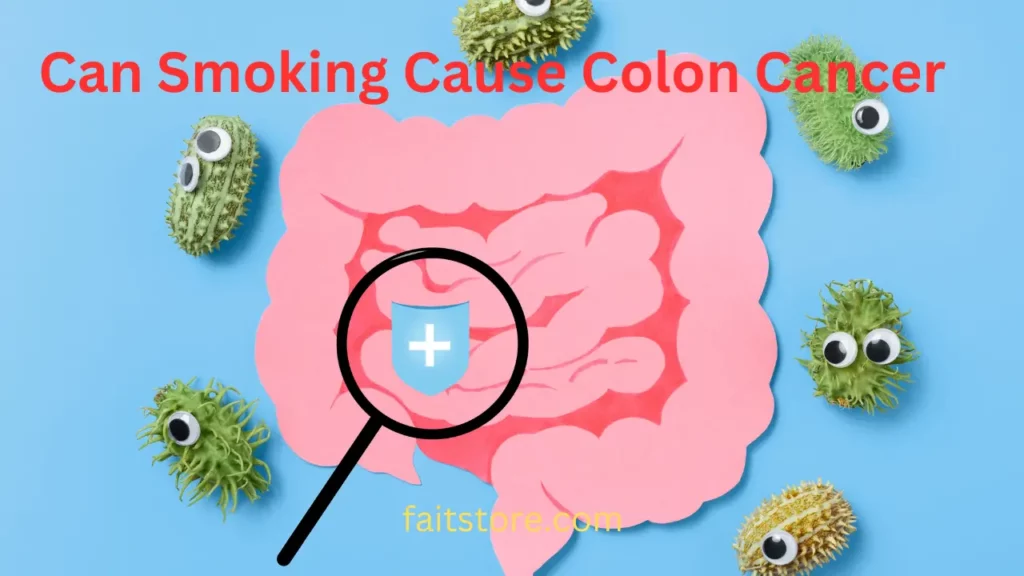
Conclusion
In conclusion, the evidence strongly suggests that smoking can cause colon cancer. The harmful chemicals in tobacco smoke can lead to genetic mutations and cellular damage in the colon, increasing the risk of developing cancerous cells. Quitting smoking is vital for reducing the risk of colon cancer and improving overall health. If you’re a smoker, consider seeking support and resources to help you quit this dangerous habit. Your well-being is worth the effort.












